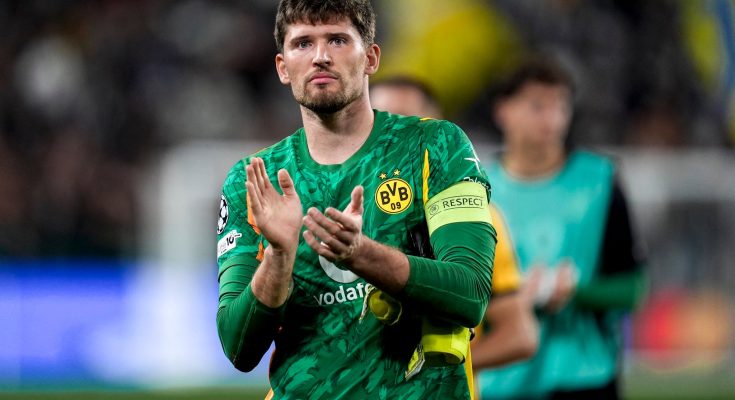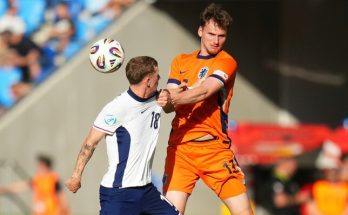The gripping spectacle between Borussia Dortmund and Juventus Turin made global headlines, a football night that lived up to its promise of intensity, drama, and world-class passion. Signal Iduna Park was packed with anticipation as the two European heavyweights clashed in a battle that could have been a Champions League classic. On the pitch, emotions ran high, tackles flew, chances came thick and fast, and the black-and-yellow faithful roared their team forward in waves of deafening chants. Yet, while the night ended with adrenaline and footballing pride, it soon descended into a sobering reality. Behind the curtain of euphoria and drama, a devastating piece of news unfolded: Borussia Dortmund’s regular goalkeeper suffered a painful wrist injury shortly after the final whistle. What began as a story of excitement and spectacle quickly transformed into concern and uncertainty for the club, its players, and millions of fans worldwide.
The goalkeeper, a pillar of reliability and leadership for the team, had delivered yet another high-caliber performance against Juventus. Diving saves, commanding shouts to the backline, and calm distribution under pressure reminded everyone why he is regarded as one of the cornerstones of Dortmund’s setup. Fans applauded his determination, pundits praised his anticipation and reflexes, and his teammates trusted him with every move. But football, in its unpredictable nature, once again showed how fragile the fate of players can be. Moments after the game, when adrenaline subsided and bodies began to cool, the keeper clutched his wrist in visible pain. Initial reports suggested that he had been carrying discomfort for a portion of the second half, but in the heat of competition and with pride on the line, he fought through, refusing to signal for a substitution. His desire to be there for his teammates was commendable, yet that very determination may have worsened the damage.
Medical staff quickly intervened once he entered the tunnel. There, away from the noise of fans and cameras, a grim picture emerged. The wrist was visibly swollen, movements were restricted, and the pain was severe enough that he reportedly winced at the lightest touch. Dortmund’s doctors wasted no time, arranging immediate scans and tests to determine the severity. Within hours, what had been a football carnival shifted to tense waiting. The fans who had celebrated passionately outside the stadium hours earlier now found themselves refreshing news outlets, anxious for updates about their number one.
Injury to a goalkeeper is always a particular blow, given the importance of confidence, rhythm, and physical readiness in the role. For Dortmund, the timing of this setback is especially cruel. The team has been enjoying a promising run, with momentum in the Bundesliga and ambitions in Europe. Their defense had been looking sharper, partly due to the calming presence of their trusted shot-stopper. Now, questions arise not only about how long he will be sidelined, but also about who will step up in his absence.
The club has backup options, of course, but none can truly replicate the aura and leadership of the first-choice keeper. He is not just a player but a commander on the pitch, someone who reads danger before it unfolds and keeps the defensive line organized. His replacements, though talented, lack the same chemistry with the back four, and such disruptions often take a toll on performance. Dortmund supporters know this all too well; they have seen in past seasons how a sudden injury to a key player can alter the trajectory of an entire campaign.
This situation has also cast a spotlight on the relentless demands of modern football. Matches pile up, intensity grows, and recovery time shrinks. While fans love the spectacle of back-to-back big games, players’ bodies are often pushed to their limits. A wrist injury for a goalkeeper may not seem as dramatic as a torn ligament or a hamstring rupture, but in his position, every dive, punch, and catch requires full strength in the wrists. Even a seemingly minor setback can have long-lasting effects on confidence and technique. For Dortmund’s coaching staff, this means carefully balancing the medical reports with the club’s ambitions. Rushing him back could risk aggravation, but keeping him out too long could derail Dortmund’s progress.
In the hours and days following the Juventus game, statements began to circulate. The club confirmed that medical examinations were ongoing but did not commit to a timeline. Journalists pressed for more, but Dortmund, known for their cautious and professional approach, kept their cards close. Fans, however, filled the vacuum with speculation. Social media lit up with discussions: some feared a long-term absence that could stretch into months, others clung to hope that it was a sprain that would heal quickly. The uncertainty has only amplified the sense of shock.
Teammates also weighed in with messages of support. Several players posted on social media, calling him a fighter and expressing faith in his recovery. These gestures, though brief, carried weight. They showed that this was not just about an injured athlete, but about a leader whose absence will be deeply felt. Coaches, too, expressed their concern, while simultaneously assuring the public that Dortmund has the depth to cope. Still, everyone knows that the road ahead just got far more complicated.
For Dortmund’s fans, this incident is yet another emotional rollercoaster. The victory—or at least the high-level performance—against Juventus was supposed to be a marker of Dortmund’s rise on the European stage. Instead, it has left behind a bitter aftertaste. The iconic Südtribüne, where joy and passion usually reign, now buzzes with anxiety about how the team will adjust. Supporters who traveled to the match shared images of their celebrations, only to follow them with worried messages about the goalkeeper. That emotional whiplash is the essence of football: joy and despair often live side by side.
What adds further tension is the upcoming calendar. Dortmund faces crucial fixtures in both the domestic league and Europe. Their title ambitions, their hope to progress deep into continental competition, and their desire to keep momentum alive all depend on stability at the back. Rival clubs will be watching this development closely, aware that an unsettled Dortmund defense could be vulnerable. This is football at its most unforgiving: one player’s misfortune can ripple across an entire campaign.
As for the goalkeeper himself, he now faces a battle of patience and resilience. Injuries are not just physical challenges but mental ones. Sitting on the sidelines, watching teammates fight on without being able to contribute, is often the hardest part. He has built his career on consistency and toughness, and those qualities will be tested now more than ever. The road to recovery, no matter how long or short, will demand discipline, trust in the medical staff, and faith in his own body.
For the club hierarchy, this is also a test of planning and resource management. They must decide whether to rely fully on existing backups, accelerate the development of young prospects, or consider emergency options in the transfer market if the injury proves severe. The January window is not far away, and such unforeseen setbacks sometimes trigger moves that would otherwise not have been considered. Fans will be eager to see whether Dortmund makes a bold decision or places their trust in the squad they already have.
The Juventus game itself may eventually be remembered not for the goals or drama, but for the moment the goalkeeper walked off with visible discomfort. That snapshot symbolizes the fine line between triumph and tragedy in professional sport. One minute, players are heroes on the field; the next, they are vulnerable humans battling pain. And in Dortmund’s case, that thin line could influence the entire shape of their season.
As the days progress, clarity will emerge. Scans will reveal whether the wrist is sprained, fractured, or worse. Rehab plans will be drawn up, and timelines established. Until then, Dortmund fans remain in limbo, their hopes suspended by medical reports. They will wait, they will worry, but above all, they will stand behind their goalkeeper, just as he has stood between them and defeat countless times before. Football is, after all, as much about solidarity in hard times as it is about joy in victory.
For now, Borussia Dortmund must regroup. The Juventus game is in the books, but the true battle lies ahead—on the field, in the training ground, and in the treatment room. The injury to their regular goalkeeper is a shock that few saw coming, but it is also a chance to show resilience, unity, and character. This is the nature of football: when fate delivers a blow, the true measure of a team is how it responds. And for Dortmund, the black-and-yellow story of this season has just taken a dramatic, uncertain turn

